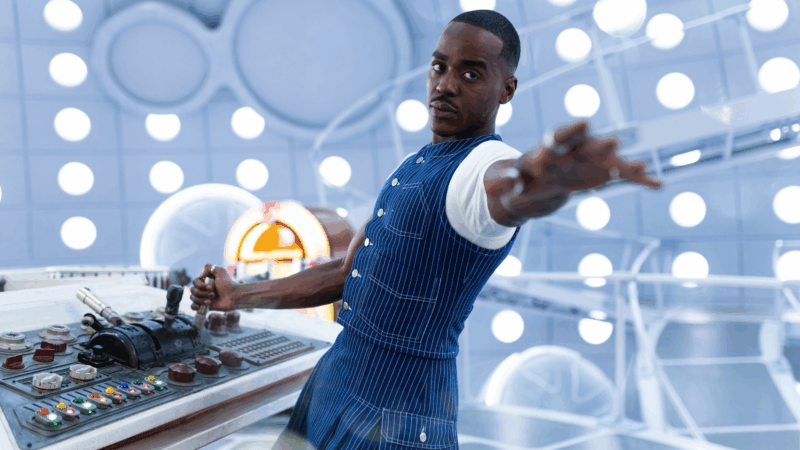‘Doctor Who’ is about possibility. Ncuti Gatwa’s role embodied that
Actor Ncuti Gatwa’s brief stint as the mercurial, time-traveling Doctor on the British series Doctor Who came to an end last Saturday.
His Fifteenth Doctor represented a welcome departure from the direction the show had settled into before his arrival. Some of that sense of newness could be chalked up to the simple fact of his casting: He was the first Black actor, the first openly queer actor and the first African-born actor to inhabit the role. (Gatwa is Rwandan-Scottish, making him the fourth Scottish actor to play the Doctor on telly. Yawn.)
There was also the shift in showrunner. Russell T. Davies returned and oversaw Gatwa’s run on the series, having first revived Doctor Who back in 2005 and left in 2010. What Davies has thus far brought to his second bite of the Who apple has proven … mixed. He’s nudged the series into the realm of pure fantasy by having the Doctor tangle with a pantheon of actual gods played by people like Neil Patrick Harris and Jinkx Monsoon. Over the years, the sci-fi series has featured many plot elements that seemed supernatural at first, only to have the Doctor inevitably and triumphantly reveal their basis in science and technology by story’s end. To those of us who look to the Doctor to represent a kind of super-powered secular humanism, the show’s credulous embrace of religion and superstition feels like a breach of contract with the viewer.
But I can’t quibble with the casting of Harris and Monsoon, inasmuch as it speaks directly to something else that Davies and Gatwa have collectively brought to the franchise: a bracing, unapologetic, not-remotely coded queerness.
Gatwa’s Doctor fell in love with a time-traveling bounty hunter played by Jonathan Groff, he radiated a flirtatious charisma that charmed … well, pretty much anyone and anything. And tellingly, his was the first Doctor who refused to lock themselves down to a single outfit over the course of their tenure. Gatwa’s Doctor was a cosmic clotheshorse given to form-fitting couture of every sort, and closed out his time by sporting a fabulous pin-striped suit-dress that would make Doctors One through Fourteen choke on their jelly babies. (Though I feel like Three and Thirteen would be down with it. Six would be, too, but he’d never admit it.)
But maybe Gatwa’s most enduring contribution to the legacy of Doctor Who is how his casting, and his performance, finally allowed a series about an alien who can ostensibly look like anybody to truly explore the ramifications of that idea for the first time.
Gatwa’s Doctor was more emotionally available than any Doctor since David Tennant’s Ten (and Fourteen; long story). He laughed easily, cried regularly and easily expressed his affection for those around him. He seemed healthy, healed, whole – a welcome change.
But maybe Gatwa’s most enduring contribution to the legacy of Doctor Who is how his casting, and his performance, finally allowed a series about an alien who can ostensibly look like anybody to truly explore the ramifications of that idea for the first time.
Whenever the Doctor shows up someplace, they take charge. Everyone defers to them as a matter of course. Prior to 2005’s “New Who” era, this wasn’t something the series seemed interested in addressing. But Davies introduced the notion of “Psychic Paper” – the Doctor’s ability to flash a blank piece of paper at someone and have it register as whatever credential they needed it to be. But we all knew this was hand-waving, a retcon: The Doctor’s real authority derived from the fact that they were, until very recently, a white guy of privilege.
Jodie Whittaker’s Thirteenth Doctor didn’t have it so easy, being a woman, but it wasn’t a major theme of her tenure. Yet again and again, Gatwa’s Doctor confronted racism both overt and implicit. He’d ruefully note how much harder he had it than the others, then set about doing what had to be done.
But this was a lesson he had to learn – and we watched him as learned it. In the episode “Dot and Bubble,” the Doctor saves the day, as he usually does. But when the white racists he’s saved refuse his help to relocate to a place of safety, we see Gatwa slowly come to understand why. Agonizingly, he cycles through confusion, exasperation, realization, outrage and, finally, sorrow. And Gatwa brings us all along for that heartbreaking ride.
It’s the kind of story, the kind of moment, that only Gatwa’s Doctor could bring us, and it’s a testament to the abiding need for hoary institutions like Doctor Who to widen out and bring in new perspectives.
To be fair, that episode was written by Davies, a white guy. But another episode, “The Story and the Engine,” featuring the West African myth of Anansi, was written by Nigerian-born poet Inua Ellams, and it felt like a refreshingly new kind of Who.
I wouldn’t say that Gatwa’s Fifteenth Doctor nailed his dismount. His final minutes felt rushed, and his send-off episode featured both of his companions (Varada Sethu’s Belinda and Millie Gibson’s Ruby) suddenly manifesting maternal instincts out of precisely nowhere and spending just a really very weird amount of their last minutes of screentime toting random babies in their arms. (And as for who we see him regenerate into, in the season finale’s closing seconds? Yeah, I don’t buy it. That’s clearly a fake-out.)
But Ncuti Gatwa can be proud of what he brought to Doctor Who, a series rooted in the notion of limitless possibility, of bold narrative innovation, but that has too often contented itself with iteration. Gatwa’s Doctor found a way to take us to new corners of the universe, and he did so with a dazzling smile that would charm the plunger off a Dalek.
This piece also appeared in NPR’s Pop Culture Happy Hour newsletter. Sign up for the newsletter so you don’t miss the next one, plus get weekly recommendations about what’s making us happy.
Listen to Pop Culture Happy Hour on Apple Podcasts and Spotify.
U.S. unexpectedly adds 130,000 jobs in January after a weak 2025
U.S. employers added 130,000 jobs in January as the unemployment rate dipped to 4.3% from 4.4% in December. Annual revisions show that job growth last year was far weaker than initially reported.
Greetings from Mexico City’s iconic boulevard, where a dog on a bike steals the show
Every week, more than 100,000 people ride bikes, skates and rollerblades past some of the best-known parts of Mexico's capital. And sometimes their dogs join them too.
February may be short on days — but it boasts a long list of new books
The shortest month of the year is packed with highly anticipated new releases, including books from Michael Pollan, Tayari Jones and the late Nobel laureate Mario Vargas Llosa.
Shootings at school and home in British Columbia, Canada, leave 10 dead
A shooting at a school in British Columbia left seven people dead, while two more were found dead at a nearby home, authorities said. A woman who police believe to be the shooter also was killed.
Trump’s EPA plans to end a key climate pollution regulation
The Environmental Protection Agency is eliminating a Clean Air Act finding from 2009 that is the basis for much of the federal government's actions to rein in climate change.
The U.S. claims China is conducting secret nuclear tests. Here’s what that means
The allegations were leveled by U.S. officials late last week. Arms control experts worry that norms against nuclear testing are unraveling.







